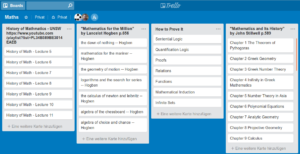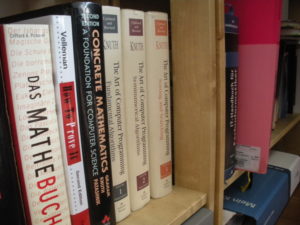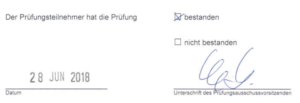<tl;dr> on the 28th of June, 2018, I passed the last part of my exams for the Berufsabschluss: a two year vocational degree. I talk about this and go over thoughts for the future </tl;dr>
 Last month I posted a rather long update about the IHK — Chamber for Industry and Trade — Exams; I went into all the stuff leading up to now. Well, on the 28th of June, I walked into the exam room on a campus south of Berlin and presented my project to the three members of the exam committee assigned to me. Sitting on a wooden bench in the hallway and waiting for the committee members to show up, I was reminded of waiting in a hallway to deliver the oral part of my undergrad exams in June of 2003; I was so sick with fear then that I thought I might actually throw up. Finally I was called into the room, set up my gear, delivered my speech, answered the questions, and then stepped back into the hall while the committee deliberated the result.
Last month I posted a rather long update about the IHK — Chamber for Industry and Trade — Exams; I went into all the stuff leading up to now. Well, on the 28th of June, I walked into the exam room on a campus south of Berlin and presented my project to the three members of the exam committee assigned to me. Sitting on a wooden bench in the hallway and waiting for the committee members to show up, I was reminded of waiting in a hallway to deliver the oral part of my undergrad exams in June of 2003; I was so sick with fear then that I thought I might actually throw up. Finally I was called into the room, set up my gear, delivered my speech, answered the questions, and then stepped back into the hall while the committee deliberated the result.
After about 10 minutes, I was called back in and presented a piece of paper with the check box “passed” ticked off. There was a solemn moment as I was conferred the title of IT-Fachinformatiker Anwendungsentwicklung, and then the moment passed and I headed back into the hallway. Now that the goal of the last 14 months has been met, it’s time to take a bit of time and reflect on where I am and what’s next.
The degree is done and I have a couple of credentials in software development; I finally feel I can start steering my career in that direction. In the last ten years I have developed some very definite ideas about what makes a good software developer and what writing software is even about. These are just ideas, mind you: theories that have yet to be proven through experience. Taking an interest in the history of the subject, I’m increasingly of the opinion that the core of computing systems, and the software that runs on them, is all math. My next long term goal is to read the pioneers of this field — Turing, Von Neumann, Shannon, et al. — and really understand what they’re talking about, and that means building some serious math skills. I want to go deep and get very close to the machine. What’s happening down there? I’ve read enough articles about people working in the field saying they’ve used Big O notation twice in their career, but I want to learn that stuff. And to get those math skills are a big challenge for me: a challenge in the form of another long term goal that will probably take years. Why? Well, my education has been very unconventional and I never explored math much up through college. It was one of those things that I found interesting, but also really frustrating and painful. I’m sure lots of people out there can sympathize. The more I get into the subject of math, the more I realize that there are a ton of misunderstandings out there about what math is and how it works. So, to build the skills I need, I have to get back to basics.  Math can be an unforgiving subject; you really have to lay strong foundations and build slowly to get the understanding you need to progress to the next level. So, I put together a Trello board and I’m working through all the Khan Academy materials, trying to play catch-up. It’s a little humbling to be going through some of this material at the age of 41, but I hope it IS true that it’s never too late to learn…even though the history books clearly show that math is a young man’s game. At the same time that I’m working on this math angle, I DO want to work on coding projects and getting more familiar with different programming languages and tools. But I’m also keeping my eye on these foundational topics that are running under the technology; it’s my belief that if you want to excel at a subject, you need to build context: understand where it came from, what problems it was trying to solve, what the people who made it thought. Math is at the heart of this because that’s where these systems came from. Von Neumann’s MANIAC — the first stored program computer — was designed to perform artillery trajectory calculations for the navy as well other projects that humans would require several years to do by hand: projects the machine could do in a batch job that would last an evening.
Math can be an unforgiving subject; you really have to lay strong foundations and build slowly to get the understanding you need to progress to the next level. So, I put together a Trello board and I’m working through all the Khan Academy materials, trying to play catch-up. It’s a little humbling to be going through some of this material at the age of 41, but I hope it IS true that it’s never too late to learn…even though the history books clearly show that math is a young man’s game. At the same time that I’m working on this math angle, I DO want to work on coding projects and getting more familiar with different programming languages and tools. But I’m also keeping my eye on these foundational topics that are running under the technology; it’s my belief that if you want to excel at a subject, you need to build context: understand where it came from, what problems it was trying to solve, what the people who made it thought. Math is at the heart of this because that’s where these systems came from. Von Neumann’s MANIAC — the first stored program computer — was designed to perform artillery trajectory calculations for the navy as well other projects that humans would require several years to do by hand: projects the machine could do in a batch job that would last an evening.
As soon as I can get to a good place with the math, it’s time to tackle the Knuth. I bought the first  three volumes of his “Art of Computer Programming” several years ago. Those books are so expensive that it made more sense to have my copies shipped from Tacoma to Berlin then to repurchase them here. That’s a little crazy to think about, but there it is. You don’t have to go deep into math and read all of Knuth to develop software, but, if you DO take that plunge, you might just become a great developer. At least, that’s the theory that I’m currently operating from. I’ll just have to keep experimenting and seeing what works. The future, at any rate, is now. As the IHK degree comes to a close, the next chapter opens. And I’m so ready to see where this road leads next.
three volumes of his “Art of Computer Programming” several years ago. Those books are so expensive that it made more sense to have my copies shipped from Tacoma to Berlin then to repurchase them here. That’s a little crazy to think about, but there it is. You don’t have to go deep into math and read all of Knuth to develop software, but, if you DO take that plunge, you might just become a great developer. At least, that’s the theory that I’m currently operating from. I’ll just have to keep experimenting and seeing what works. The future, at any rate, is now. As the IHK degree comes to a close, the next chapter opens. And I’m so ready to see where this road leads next.

Post a Comment